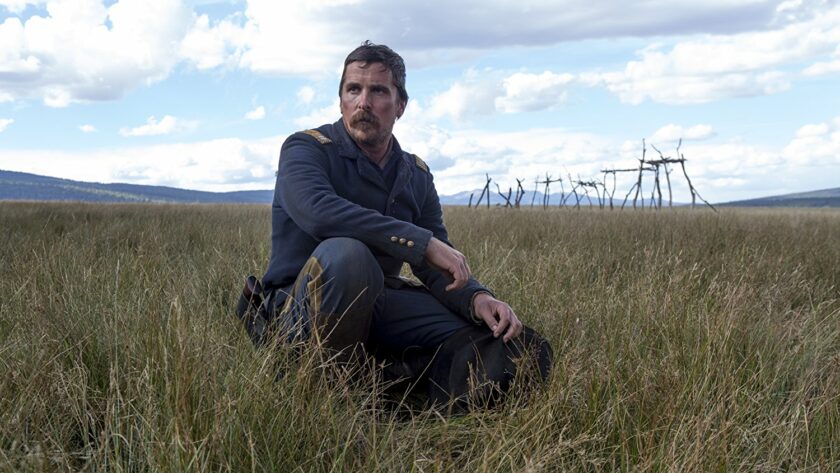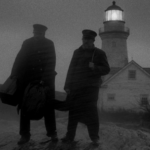Liam Donovan examines Scott Cooper’s gritty Western.
In Scott Cooper’s latest film, the gruelling western Hostiles, two former foes are asked to put their differences aside and embark on a long voyage together. These men, a soldier and a Cheyenne war chief, are attempting to leave behind the violent life which has always followed them and cross the American frontier. Their journey is set against the backdrop of a landscape both brutal and beautiful – a common contrast in the genre – and witnesses these characters’ attempts to forgive each other and, more importantly, forgive themselves.
If the director’s last feature, Black Mass, was cold and callous without clear narrative purpose, then Cooper’s work here is imbued with romantic sweep and cinematic grandeur. The frontier stands as a majestic, sacred land that, for all its splendour, remains unstable and uncertain. This is a revisionist tale battling to reconcile the relationship between America and its native population, neither side innocent of violence in the struggle for freedom and ownership over these lands.
Set in the Old West of 1892, Captain Joseph Blocker (Christian Bale) is approaching the end of his military career and preparing for retirement when his Colonel (Stephen Lang) orders him to complete one last mission, the escort of Yellow Hawk (Wes Studi) and his family back to their tribal lands in Montana. A general in the Cheyenne forces Blocker has fought against on many occasions, the chief is now dying and must return home, a mandate which Blocker takes serious issue with given their fraught history.
Forced to carry out his orders, the captain sets off with Hawk’s family and a detail of fellow soldiers. They will meet suicidal widow Rosalie (Rosamund Pike), a deadly group of Comanche warriors, and other challenges along the way. What should be a relatively simple endeavour soon becomes a whole lot more complicated, with Blocker beginning to question his previous prejudices towards the native people as the bond between the travellers grows stronger, their barbaric past and present not so easy to escape.

Recently, westerns have tended to skewer their focus one way or another, from the blockbuster fare of the recent Magnificent Seven remake to smaller films like Jane Got a Gun, highlighting the destructive and abusive nature of the white man. Others such as Bone Tomahawk have chosen to highlight the threat of indigenous, cannibalistic tribes who gruesomely oppose the American lifestyle by quite literally consuming their enemies. Hostiles stands out then for its slower, balanced and more contemplative approach towards the subject matter of both conflict and violence, the metaphorical journey of overcoming such a problematic hurdle echoing the literal expedition that also takes place. The quest is mapped out by the episodic structure writer and director Cooper employs, telling a larger story vicariously through a series of self-contained events to form a tapestry of life in a period where old values are making way for what feels like a more hopeful and compassionate philosophy.
If Hostiles is thematically flawed in any way, it is probably because it refuses to commit, at least entirely, to hope. The spiritual passage from the ardour experienced by the characters leads to a proverbial light at the end of the tunnel, but this is seemingly upended in the final act, and even an eloquent and poignant epilogue cannot quite salvage it. The long duration of this film is often broiled in depression and regret, the overwhelming negativity of the world-view never reconciled by a satisfying note of optimism.
The conclusion may leave you somewhat mystified, or perhaps wondering where the American and Native populations are left by the events we have just witnessed. That being said, Cooper’s feature is as picturesque and elegant as it is despairing. The cinematography of Masanobu Takayanagi gorgeously renders the American frontier as a staggering and vibrant expanse which, despite the gloomy philosophical horizon which Hostiles offers, still begs to be explored.

Equally evocative is the music from Max Richter, a score that manages to be both eerie and intimate, the composer incorporating unique instrumentation, and strange, unearthly sounds to emphasise the isolation and danger posed to Blocker’s group as they traverse the vast wilderness ahead of them.
Cooper’s structure does translate to screen in a rather disjointed manner, with the various episodes breaking up the story into disparate elements rather than contributing to a consistent whole. The film juxtaposes quieter moments with the frenzy of a Comanche attack, or the chase of an escaped prisoner, and this does communicate the suddenness of violence and conflict, across this complicated landscape, quite effectively. On the other hand, there are also long stretches of Hostiles where it is difficult to actively engage with what feels like familiar territory being trodden once again, the film too long and overly ponderous by the same token.
The sheer number of characters, interlocking storylines and personal relationships presented to us, throughout the movie, ultimately means that very little is developed enough and Hostiles rarely carries the emotional heft a morose and existential western like this should possess. Yellow Hawk’s family is given particularly short shrift: the chief’s son Black Hawk (Adam Beach) and his wife Elk Woman (Q’orianka Kilcher) pretty much voiceless for the large majority of the film, while the likes of Jesse Plemons and Timothee Chalamet don’t exactly get their moment to shine either. Even the appearance of Ben Foster later in the film is wasted, too much of the runtime spent on drawn-out, brooding shots when it could have been used to flesh out more of the supporting characters and their acquaintance with one another. As people inevitably perish and check out along the way to Montana, it’s hard to care much. There are however some stand-out scenes where Cooper allows the hardened, and impossibly stern, soldiers to demonstrate a great deal of vulnerability, as in the moment where Blocker must say a painful goodbye to his corporal (Jonathan Majors).

If one thing doesn’t disappoint in Hostiles, it is the nuanced and committed performances; Bale is a typically commanding presence at the centre of the film, convincingly portraying someone morally confused, often stubborn and sincerely mournful. If this is a middle-tier role for him, highlighted by the fact that he isn’t in the awards conversation which he always seems to be a part of, then it’s a testament to the quality of his career and ability as an actor.
Rosamund Pike and Wes Studi provide sturdy support. Pike renders Rosalie’s strife quite palpable, and the thoughtful stoicism of Yellow Hawk is a great foil to the harsh severity of Blocker. This triumvirate of performers are easily the most interesting and fascinating to explore, Pike’s Rosalie teaching Blocker the important lesson of forgiveness, while Blocker’s ability to reconcile with his former enemy allows Yellow Hawk to achieve a certain satisfaction before he passes away. Cooper might lose focus, but Hostiles works best when it hinges around these characters.
While similar criticisms to those levelled at Black Mass also apply here, such as the excess of characters, awkward structure and needlessly bleak sensibility, this does mark an improvement for Cooper. Hostiles is a far more artful and intelligent piece of cinema that considers important themes and intriguingly reassesses American ideology.
The direction may be overly dour, as opposed to exhilarating, but the quality of the performances is enough to keep you invested in this often uneventful tale, the runtime padded by less involving sub-plots and emotional crescendos that don’t quite have the desired impact. If it’s any consolation, this is exactly the kind of film fathers and grandfathers will probably love: a meaty, tough and violent drama full of pathos and anger, aspects which ultimately chain it to convention.
Hostiles is out now in UK cinemas (released January 5th). Check out the trailer:




